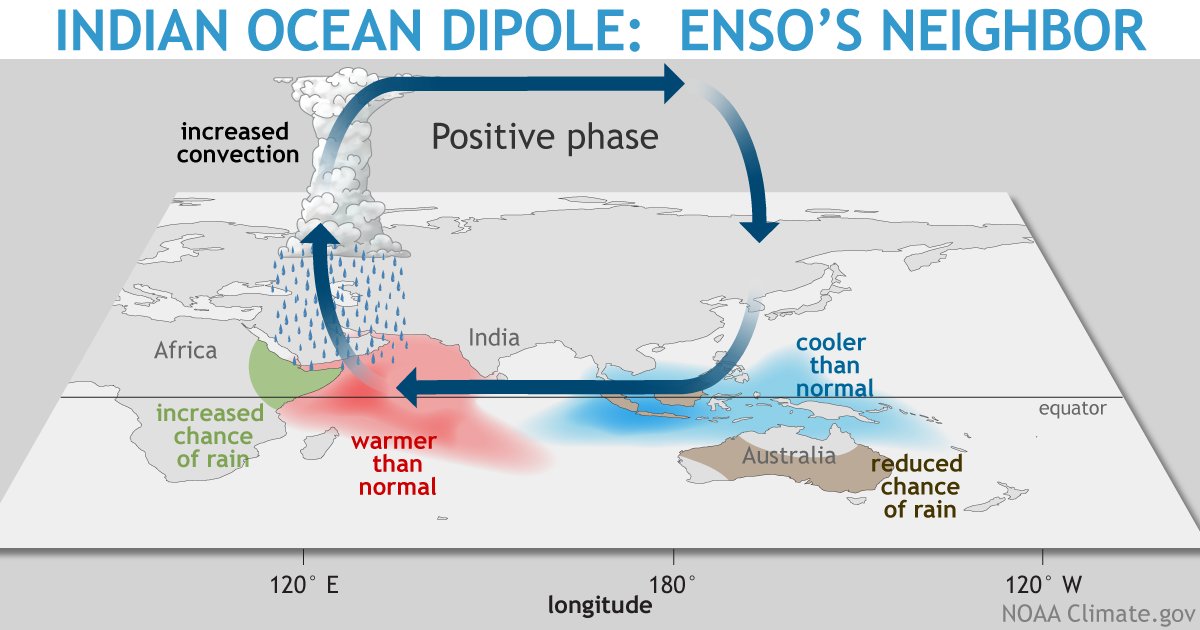Ahmedabad
(Head Office)Address : 506, 3rd EYE THREE (III), Opp. Induben Khakhrawala, Girish Cold Drink Cross Road, CG Road, Navrangpura, Ahmedabad, 380009.
Mobile : 8469231587 / 9586028957
Telephone : 079-40098991
E-mail: dics.upsc@gmail.com

Indian Ocean Dipole
News: With the El Nino phenomenon almost certain to affect the Indian monsoon this year, high hopes are pinned on the development of a positive Indian Ocean Dipole (IOD) and its ability to counterbalance the El Nino effect.
What is IOD?
• The IOD is an ocean-atmosphere interaction very similar to the El Nino fluctuations in the Pacific Ocean, playing out, as the name shows, in the Indian Ocean. It is also a much weaker system than El Nino, and thus has relatively limited impacts.
• IOD, sometimes referred to as the Indian Nino is a phenomenon playing out in the relatively smaller area of the Indian Ocean between the Indonesian and Malaysian coastline in the east and the African coastline near Somalia in the west.
• One side of the ocean, along the equator, gets warmer than the other.
What is a positive IOD? What is its impact?
• IOD is said to be positive when the western side of the Indian Ocean, near the Somalia coast, becomes warmer than the eastern Indian Ocean.
• A positive IOD enhances monsoon rainfall over the Indian subcontinent and along the African coastline but it suppresses rainfall over Indonesia, south-east Asia and Australia.
What is a negative IOD? What is its impact?
• IOD is said to be negative when the western side of the Indian ocean becomes cooler than the eastern Indian ocean.
• A negative IOD shows opposite impacts of Positive IOD.
Which are the factors considered while making forecasts about monsoon in the month of April?
The Earth System Science Organisation (ESSO) and the IMD take into account five factors.
• The Sea Surface Temperature (SST) gradient between the North Atlantic and the North Pacific (conditions during December of the previous year and January of the present year)
• SST of the equatorial south Indian Ocean (conditions during February and March of the present year)
• Mean Sea Level pressure in East Asia (conditions during February and March of the present year)
• The surface air temperature over northwest Europe (conditions during January of the present year)
• The warm water volume of the equatorial Pacific Ocean (conditions during February and March of the present year)
Source – Indian Express, IMD

Address : 506, 3rd EYE THREE (III), Opp. Induben Khakhrawala, Girish Cold Drink Cross Road, CG Road, Navrangpura, Ahmedabad, 380009.
Mobile : 8469231587 / 9586028957
Telephone : 079-40098991
E-mail: dics.upsc@gmail.com
Address: A-306, The Landmark, Urjanagar-1, Opp. Spicy Street, Kudasan – Por Road, Kudasan, Gandhinagar – 382421
Mobile : 9723832444 / 9723932444
E-mail: dics.gnagar@gmail.com
Address: 2nd Floor, 9 Shivali Society, L&T Circle, opp. Ratri Bazar, Karelibaugh, Vadodara, 390018
Mobile : 9725692037 / 9725692054
E-mail: dics.vadodara@gmail.com
Address: 403, Raj Victoria, Opp. Pal Walkway, Near Galaxy Circle, Pal, Surat-394510
Mobile : 8401031583 / 8401031587
E-mail: dics.surat@gmail.com
Address: 303,305 K 158 Complex Above Magson, Sindhubhavan Road Ahmedabad-380059
Mobile : 9974751177 / 8469231587
E-mail: dicssbr@gmail.com
Address: 57/17, 2nd Floor, Old Rajinder Nagar Market, Bada Bazaar Marg, Delhi-60
Mobile : 9104830862 / 9104830865
E-mail: dics.newdelhi@gmail.com